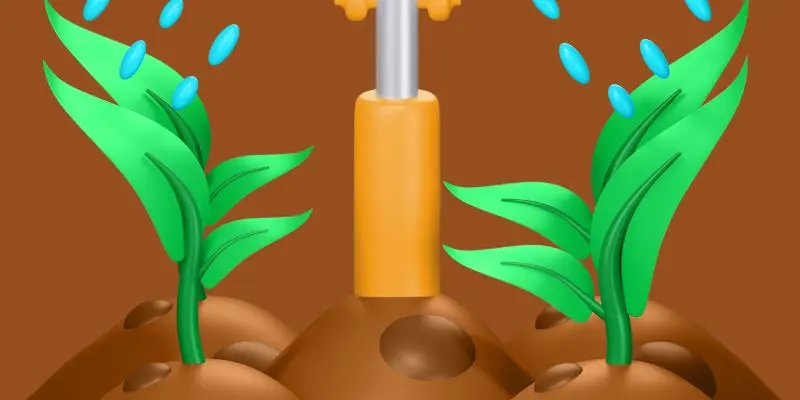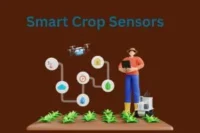Smart Irrigation: A New Era for Farming
Published: 19 Mar 2025

Smart irrigation is ushering in a new era for farming, where water usage is optimized for maximum efficiency. With the growing challenge of water scarcity, this innovative technology ensures that every drop counts. By using real-time data and advanced systems, smart irrigation helps farmers provide the right amount of water to crops, improving yields and reducing waste. This new approach is not only making farming more sustainable but also paving the way for a more resource-conscious future in agriculture.
So, guys, without wasting time, let’s jump into the article to learn Smart Irrigation: A New Era for Farming
1. Efficient Water Usage
Smart irrigation ensures that water is applied precisely where and when it’s needed, preventing overwatering and waste.

- Delivers water directly to the roots, reducing evaporation.
- Ensures crops get the right amount of water for optimal growth.
- Significantly reduces water wastage compared to traditional irrigation methods.
2. Real-Time Data and Automation
By using real-time data from weather stations and soil moisture sensors, smart irrigation systems adjust water delivery automatically.
- Monitors soil moisture and weather conditions to make real-time adjustments.
- Optimizes irrigation schedules to avoid over or underwatering.
- Reduces human error, ensuring consistent and efficient irrigation.
3. Water Conservation
In regions where water is scarce, smart irrigation provides an essential solution by conserving water without compromising crop yield.

- Helps farmers save water by applying it more efficiently.
- Reduces dependence on local water resources, promoting sustainability.
- Supports water conservation in areas affected by drought and climate change.
4. Improved Crop Yields
By providing crops with just the right amount of water, smart irrigation boosts plant health and productivity.
- Prevents stress on crops caused by overwatering or underwatering.
- Promotes stronger, healthier crops that yield higher quality produce.
- Increases farm productivity, leading to more food grown with fewer resources.
5. Cost Savings
While the initial setup of smart irrigation systems may be an investment, the long-term savings are substantial.
- Reduces water and energy consumption, lowering operational costs.
- Cuts down on water bills by ensuring precise, efficient use of water.
- Minimizes the need for costly irrigation labor and maintenance.

6. Environmental Benefits
Smart irrigation not only helps farmers but also has a positive impact on the environment by reducing water usage and minimizing runoff.
- Decreases runoff, preventing water wastage and pollution.
- Reduces the environmental footprint of farming practices.
- Helps protect local water systems and ecosystems.
7.Scalability and Flexibility
Smart irrigation systems can be customized to fit a wide range of farm sizes and types, offering flexibility for both small and large-scale operations.
- Adaptable to various farm sizes.
- Seamless integration with existing systems.
- Customizable for different crop types and climates.
- Smart irrigation provides valuable data to guide long-term farming strategies, improving future crop management and water use.
- Stores historical data for better decision-making.
- Uses predictive analytics for optimized water use.
- Supports sustainable long-term farming practices.
.9. Reduced Labor Costs
Smart irrigation reduces the need for manual labor, allowing farmers to focus on other important tasks while the system takes care of watering automatically.
- Automates irrigation, reducing manual work.
- Cuts down on labor costs and time spent on irrigation tasks.
- Frees up resources for other important farming activities.
10. Enhanced Crop Quality
By providing consistent and precise water delivery, smart irrigation helps improve the overall quality of crops, resulting in healthier produce.
- Ensures even water distribution for uniform crop growth.
- Leads to healthier, more robust crops.
- Enhances the quality and marketability of produce.
Conclusion
Smart irrigation is revolutionizing the farming industry by making water use more efficient, sustainable, and cost-effective. With the help of technology, farmers can now manage their water resources more effectively, leading to better crop yields and lower environmental impact. As we face the challenges of water scarcity and climate change, smart irrigation represents a bright future for agriculture, ensuring that we can produce more with fewer resources while protecting the planet.

- Be Respectful
- Stay Relevant
- Stay Positive
- True Feedback
- Encourage Discussion
- Avoid Spamming
- No Fake News
- Don't Copy-Paste
- No Personal Attacks

- Be Respectful
- Stay Relevant
- Stay Positive
- True Feedback
- Encourage Discussion
- Avoid Spamming
- No Fake News
- Don't Copy-Paste
- No Personal Attacks





